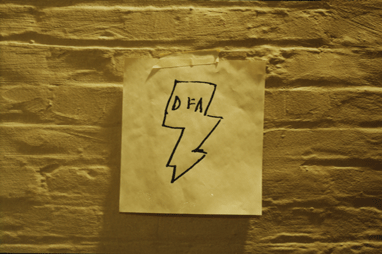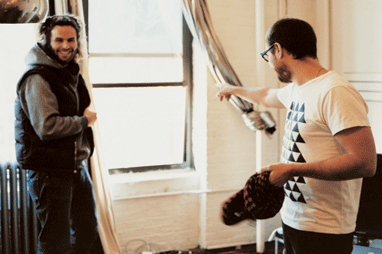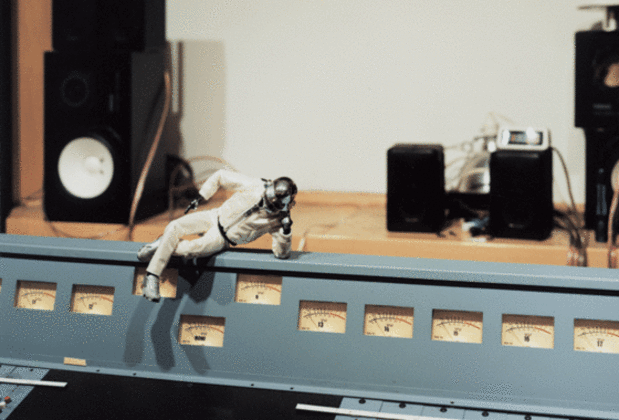Read Matthew Schnipper's feature on the next wave of New York City dance label DFA Records after the jump.
Story Matthew Schnipper
Photography Anna Bauer
Jonathan Galkin is nice enough to offer me a bagel when he tells me Syclops doesn’t do interviews. Galkin, a partner in the dance label DFA, along with co-founders James Murphy and Tim Goldsworthy, is referring to Maurice Fulton, the DJ and production half of Mu, who has been recording blurpy techno under the name Syclops. Galkin doesn’t even try to pretend he can persuade Fulton into being interviewed or photographed—he just gives me a stoic and rehearsed “no.” It’s nice not to be bullshitted, and nice to sit across from someone under 70 years old who enjoys whitefish on his bagel.
DFA’s office is, in many ways, Galkin’s office. Murphy’s LCD Soundsystem has taken him away on lengthy tours, physically removing him from DFA’s sunny West Village office space. Goldsworthy is busy too—he recently had a child (his second) and is focusing more on production, less on business. “I’m good at kind of wandering in and being like ‘I prefer purple,’” says Goldsworthy, “but Excel spreadsheets and stuff like that, that’s just not me.” Galkin, a sort of silent partner (along with Justin Miller, the silent partner’s silent partner), is running with that deference.
DFA has 20 12-inch singles slotted for release this year (from Invisible Conga People, Juan Maclean and Pylon, among others) and albums from Hockey Night, Shit Robot and Syclops. There is also Death From Abroad, the Galkin-helmed spin-off label dedicated to more obscure, non-US dance music. This fierce surge of production began late last year, with a glut of 12-inches from new, mostly New York-based groups that harken back to DFA’s early days of bridging the gap between homespun electronics and post-teenage post-punk. Then with the departure of Black Dice and the stride of LCD Soundsystem and Hot Chip, DFA became synonymous with mainstream dance-rock while the weird fun got lost along the way. Now it’s returning. And while in 2008 it seems slightly dangerous to put both hope and a business plan behind a landslide of vinyl dance singles, Galkin sees no other choice. “It’s sort of like this anachronistic world right now where things are falling away,” he says of the music industry. “At the same time, I feel like we’re at the top of our game. It’s kind of bittersweet.”

When dance music first emerged across America three decades ago, it was a much sloppier culture. There was no mainstream audience, no Ibiza, no glowsticks, just an organic convergence of classic R&B, new technologies and a growing gay club scene. In Chicago, Detroit and New York where the house, techno and disco that forms DFA’s backbone first emerged, it was still underground music. DFA began with the Rapture, a band who had previously released records on a hardcore label before discovering the backbeat and slapbass in Gang of Four was actually kind of funky. The Rapture beefed up its own rhythm section, concentrated on the high-hat and became surprisingly successful, new recruits acting as dance music ambassadors to uninitiated fans. Now, six years into DFA, artists and fans alike have had the time and tools to absorb a broader dance history. Whereas the Rapture’s success was due in large part to untamed enthusiasm, the tracks being released by DFA today are studied and careful; made in bedrooms for bedrooms, music for club speakers and headphones no longer mutually exclusive.
Maybe it’s a natural alteration to dance music’s lineage. Disco is nearly 35 years old—old enough that a bulk of its social history was not soaked up by the young artists on DFA firsthand. And while that doesn’t change how that music sounds, it does change how it’s heard, and, thus, how it’s created. “No longer am I treated like a wizard with the computer,” says Goldsworthy of technology’s new ease, and this evolved simplicity allows for a wider field of musicians to emerge; so much more chaff but also better wheat. And while such quality goodness has always been a part of DFA, the following artists—Black Meteoric Star, Holy Ghost!, Still Going and Hercules and Love Affair—represent a broad and deep new guard for the label: enthusiastic men at work, turning catchiness into a 21st century science.

Black Meteoric Star
Before anyone at DFA knew Gavin Russom’s name they called him “The Wizard.” He was their synthesizer repairman, working out of a converted closet in their basement. Always drawn to electronic drone, he “wanted to create a sound that was organic and alive, so when I discovered analog synthesizers they seemed like the perfect tool… I taught myself the basics at home, burning circuit boards in the sink.” A synthesizer he built—red wood frame, sheet metal, hardware store knobs and sloppy Sharpie labeling—still sits upended in the corner of DFA’s studio.
Now based in Berlin, Russom has been recording his own version of acid house under the name Black Meteoric Star. “I have a lot more space to listen and reflect on things,” says Russom of his new home, but his new music—which DFA plans to release as a series of 12-inches this spring—suggests anything but. It’s brutal and claustrophobic, raw with car trunk bass rattle, flattened bells, toy sirens and pinging lasers saddled over broken drum machines flailing at a billion BPM. Initially it sounds like the middle American hardline acid of the mid-’80s—especially because Russom mixed it down to cassette—but as layers unfurl it becomes much more drastic, complex and vaguely frightening.
Prior to creating such electronic chug, Russom released Days of Mars, a colossal, drumless dreamscape of an album he recorded with collaborator Delia Gonzalez in 2005, a lifelong realization of childhood drone. “Even as a kid I was into holding down all the minor chord keys on my air organ for hours,” he says. That textured lushness is something he hears in pop music today. Speaking of a new Britney Spears song Russom might as well be talking about his own music when he says he loves “how smooth the surface is and how much you can hear bubbling under that surface.” Though the ambient sounds of Black Meteoric Star and Days of Mars are often wildly different they are not opposite so much as inverted—spectral companions, one the resuscitated version of the other.

Holy Ghost!
I really did not expect to go down to DFA’s basement studio with Holy Ghost! and start talking about Rawkus. But as teenagers, Nick Millhiser and Alex Frankel of Holy Ghost! were members of hip-hop group Automato. Millhiser remembers those early days, “You listened to Wu-Tang and you listened to Pavement.” (He says this less with endearment than with resignation.) “As far as our group of friends was concerned, it was all just pop music.” Automato took that laissez-faire approach to rap, where they learned the basics of disco from sampling West End and Prelude singles. Soon they found themselves drawn to arpeggiated synths and diva wails. “Something’s wrong with me,” Frankel said after the realization that he liked an SOS Band song, freaked out as though he’d discovered he had teenage herpes. He felt silly after discovering they were a “gigantic hit in 1978” and that “everyone around [him], especially all the producers, knew all those songs.” Alleviated by peer pressure and now more secure in their desire to make sugary disco, they’re delivering it in pure form.
“Hold On,” the first Holy Ghost! single, is a stomping, whistle-blow anthem, textured with electric piano gurgles and Frankel’s New York everyman lyrics: I love the city but I hate my job. He sounds like an amateur disco Pharrell, imperfect and helplessly lovable. So thoroughly genial, “Hold On” eventually found its way onto 200,000 computers after being chosen as the free iTunes song of the week last November. There was even a YouTube video of single-digit-aged kids spaz-dancing to a sped-up version of the song, the sure sign of a hit. Holy Ghost!’s new tracks—to be divvied between various 12-inches and an LP—lean even further populist, echoing the powerful bubblegum of Chic and the complex joy of Stevie Wonder. “I tend to gravitate to stuff that has a really good hook,” Frankel explains and they’ve aped that universality, Holy Ghost!’s music the sound of a simple abandonment of pretense played by two guys holed up in a tiny apartment.

Still Going
Eric Duncan looks kind of like Patrick Swayze in Point Break. His studied laze is the overarching vibe of Still Going, the sloppy party duo comprised of him and Liv Spencer. Friends and neighbors, they collaborated in Spencer’s Williamsburg studio (where his day job is scoring music for commercials) and released their first 12-inch for DFA late last year. The “Still Going Theme” is the pair’s statement of purpose—bottom-slap bass and “really cheap sounding” keys. “The ‘Theme’ is not really a song,” says Spencer. “The idea going into it was to reduce it to the most simple components: What will make people want to work on the dancefloor?” They decided upon simplicity: the basic loop of blunt-edged toms and the light snap of backwards snares. The song ends after six minutes but its janky piano house jabs could cycle endlessly (it’s probably not a coincidence that the b-side is titled “On and On”).
Duncan—who also DJs as half of New York-based duo Rub-n-Tug—knows what works from the business side of the booth, tempering Still Going’s giddiness with an indefatigable backbeat. “The people that go to nightclubs, those are the people we’re after,” Duncan says, making their brand of boogie creation different from other home-focused DFA artists, though the thought and effort is still the same. With a new 12-inch coming later this year they’ll be adding falsetto hooks to up the catchy factor, though those vocals are still unrecorded. The instrumental demos of these tracks have the goofy shred of Bob Seger guitar solos and the congas of 1981 disco. They’re fun and simple—a lack of embellishment is a lack of distraction. “At the end of the day,” says Spencer, “it’s about people going to clubs, forgetting their shitty week—or their great week—and just kind of like, dancing until the sun comes up.”

Hercules and Love Affair
After he hangs up my coat, Andrew Butler is excited to tell me about Wally Badarou. Wally Badarou was the keyboard player for the funky new wave group Level 42 and Butler has his 1983 solo album Echoes out of its sleeve. We’re in Butler’s small apartment amongst a billion records, a sink by the door and a cat on the couch. Badarou’s synth circus plays on the stereo and Butler explains how he and DFA’s Tim Goldsworthy first bonded over the one-man massive Echoes. Goldsworthy produced Butler’s self-titled Hercules and Love Affair album and found an immediate kinship with Butler because of his dance background. But instead of searching for some amorphous and unpinable “authentic” dance sound, Butler came with multifarious ideas spanning genre, feel and style. “Hearing Philip Glass is like hearing techno,” Butler says, and this very basic and celebratory logic about cross-genre expanses was a crucial foundation for Hercules and Love Affair.
Following his debut DFA single, “Classique #2,” came the 12-inch release of “Blind.” Truly enormous, the song is Butler’s epic, layering the pulsing of modern composition with Antony Hegarty’s smooth diva vocals above quick and shifty disco. “When I was younger I got really excited about classic house,” Butler says, and he found himself seeking the disco songs those songs sampled. “Hearing the original after I heard that vocal sampled so many times was just, like, heaven,” he says. “My focus shifted from modern dance music to old music.” This breadth of taste is evident on his album; “Easy” sounds like Arthur Russell during his late day romance with mushy technology, “You Belong” sounds alternately like acid house and freestyle with the accent of smooth vocals, “Iris” is like chipper triphop with parade-ready brass and sunshine. “My goal with the record was
I wanna make listenable, totally listenable, dance music,” Butler says. “I don’t want to make music that’s solely intended for people to dance.” And while there is no set US release date for the album (it was released in Europe on March 10th), DFA will be releasing singles with remixes and original b-sides with “softer songs,” Butler says. Those songs are tender and quiet, abutting dance music and flitting at various ends of its large canon without necessarily entering it. But, like everything Butler does with thick spirit, they are still, ineffably, Hercules.
